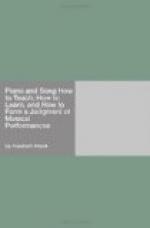There are again others who allow screaming,—“the more the better,”—in order to produce power and expression in the voice, and to make it serviceable for public performances. They may, indeed, require the singing of solfeggio, and prattle about the requisite equality of the tones; and they consequently make the pupil practise diligently and strongly on the two-lined a, b flat, b, where kind Nature does not at first place the voice, because she has reserved for herself the slow and careful development of it. As for the unfortunate gasping medium voices, which are still less docile, and which sigh in the throat, and after all can only speak, such teachers postpone the cultivation of these to the future, or else they exclaim in a satisfied way, “Now we will sing at sight! Hit the notes! Let us have classical music!” Of these, also, I forbear to speak.
And as for the singing-teachers, whose business it is to educate the voice for “the opera of the future,” I am really unable to write about them. In the first place, I know nothing about “the future,” the unborn; and, in the second place, I have more than enough to do with the present.
And now I come to those who honestly wish to teach better, and who in a measure do so. But even they are too pedantic: with prejudiced views, they pursue one-sided aims. Without looking around to the right or to the left or forwards, and without daily learning, reflecting, and striving, they run in a groove, always ride their particular hobby, cut every thing after one pattern, and use up the time in secondary matters, in incredible trifles. For the formation of a fine tone, not a minute should be lost, particularly with lady singers, who are not strong, and usually cannot or ought not to sing more than twenty days in a month, and who surely ought to be allowed to use their time in a reasonable manner. Moreover, these are the teachers whom it is most difficult to comprehend. Though they use only seven tones, they are plunged in impenetrable mysteries, in incomprehensible knowledge and a multitude of so-called secrets, out of which, indeed, nothing can ever be brought to light. For this, however, they do not consider themselves to blame, not even their hobby-horses; but, as they say, “the higher powers.” We will, for once, suppose that three-fourths of the measures which they are accustomed to employ in their treatment of the voice and of the individual are good and correct (the same is true of many piano-teachers); but the remaining fourth is sufficient to ruin the voice, or to prevent its proper development, and therefore nothing correct is to be gained. There are other teachers who never can get beyond the formation of the tone, and are lost in the pursuit of perfection,—that “terrestrial valley of tears.” Truly a beautiful country, but which is only to be found in Paradise!




